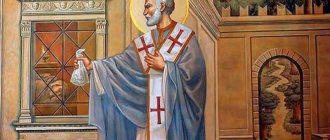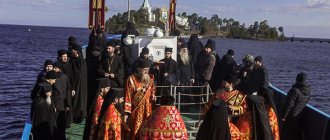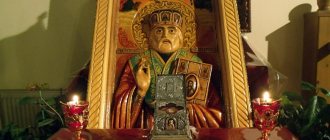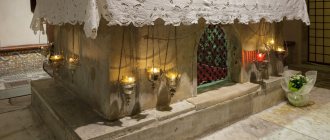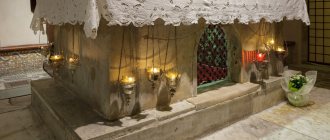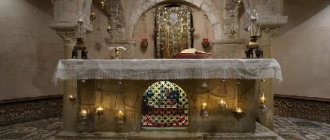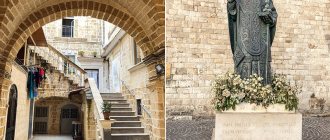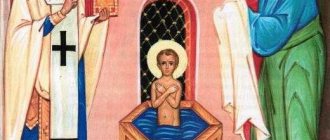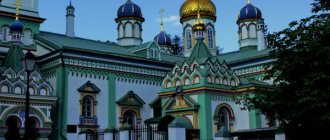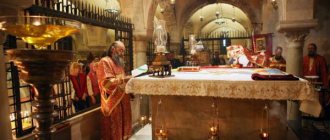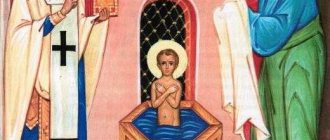Nicholas the Wonderworker of Myra of Lycia is the most popular and beloved saint in the Christian world, whose name and deeds are covered with many beautiful and instructive stories. A huge number of churches and monasteries, cities and villages are named in honor of this Wonderworker. Day of remembrance and veneration of St. Nicholas this year celebrated on December 19, as every year, this date falls during the Nativity Fast.
And in Rus' he was also called the Ugodnik. The name of this saint is so legendary that there is a need to talk about him, the winter Christian holiday dedicated to him, and the traditions associated with him in more detail. There is also a summer St. Nicholas Day.
In addition, while remaining a historical figure, Saint Nicholas the Wonderworker is in our everyday and festive life an example of not only holiness, but also true humanity, unseen kindness and readiness to help, enlighten and save in difficult times.
In his story-legend “Piebald Horses,” Alexander Kuprin wrote about Nikolai the saint: “We (in Rus' - ed.) always have a lot to do with him: to soften the heart of a cruel ruler, to expose an unrighteous judge, to punish an excessively greedy trader, to rescue him from a damp prison of an innocent prisoner, ask for mercy for someone sentenced to a needless death, give help to a drowning person, encourage the desperate, comfort a widow, place an orphan with good people.
And Nikola is his own, hasty and accessible to everyone. It is not for nothing that not only the Orthodox resort to him with requests, but also all sorts of other peoples..."
history of the holiday
December 19 is dedicated to Saint Nicholas, who became famous for his actions and selfless service to God. From early childhood he studied the Scriptures. In his young years he received clergy (title) and became a preacher. He used the wealth that he inherited from his wealthy parents for missionary work.
Many miracles are attributed to Nicholas. During his journey, he resurrected a mortally injured sailor and began to be considered the protector of travelers, merchants and children. One day Nikolai decided to secretly help three girls who did not have a dowry. He would quietly sneak into the house and leave a wallet filled with money.
On one of these visits, Nikolai threw coins into the chimney, but they did not burn, as they fell into the drying sock of one of the young ladies. This is how the legend of Santa Claus appeared. The date of the ascetic’s death began to be called the Day of St. Nicholas the Wonderworker.
During Soviet times, the holiday was forgotten. Customs were eradicated, and many of their adherents were subjected to ridicule and persecution. After the collapse of the USSR, the tradition was revived and began to gain popularity.
Who was Saint Nicholas and what does Santa Claus have to do with it?
As the life of the saint says, Nicholas was born in the 3rd century in the Greek colony of Lycia in Asia Minor into a Christian family. The boy attended church from childhood, and as he grew up, he decided to devote himself entirely to the faith, becoming a priest. He distributed the rich inheritance of his parents to the poor. Over time, Nicholas was ordained as an archbishop in the city of Myra (now the territory of Turkish Antalya) and became famous as a zealous fighter against paganism and various heresies, as well as as a miracle worker and defender of the slandered and innocently condemned. Among the miracles performed by the saint during his lifetime are the salvation of the world from a terrible famine, as well as the resurrection of a sailor during a storm.
Saint Nicholas (as high church hierarchs are called) lived to a ripe old age. Immediately after his death, his body began to flow myrrh, and believers flocked to them for relief from illnesses and sorrows. The saint’s relics were first kept in Myra, where he served as archbishop, and already in the 11th century they were transferred to the city of Bari, in Italy. Some of them are still there.
Well, how can we forget that Saint Nicholas is the well-known Santa Claus; the personality of the saint in people’s minds has merged with a folklore character. This transformation occurred due to the story of an old man with three daughters being saved from poverty. Having learned about the terrible lack of money of his parishioner, the archbishop decided to help him. He just did it secretly - at night he threw a bag of gold into the window of the house where the family lived. In the morning the money was found, but nothing was known about the name of the benefactor. The delighted father, with the dowry received in such a miraculous way, was able to celebrate the wedding of his eldest daughter. After some time, Nikolai repeated his secret gift - this is how the poor man’s middle daughter got married. Needless to say, the archbishop committed a good deed for the third time - and here the old man was finally able to watch for him and thank him.
Thus began the tradition of giving gifts in the name of the saint to children from poor families, which later spread to all children, and then to adults.
Traditions and rituals of the holiday
On St. Nicholas Day, services are held in churches. Believers eat Lenten dishes, since the holiday falls during the Nativity Fast.
On the night of December 19, parents put gifts under the child’s pillow: fruits, sweets, toys. Single girls tell fortunes about their betrothed, make wishes, and pray to St. Nicholas for a happy marriage.
On this day, housewives bake special cookies - Nikolaychiki - for the festive dinner. On the tables there are also dumplings and pies with potatoes, mushrooms, cabbage, lean borscht, and pickles.
On this day, folk festivals are popular in villages. Young people enjoy sleigh rides. In some places, the ancient tradition of caroling on December 19 has been preserved. The guys go from house to house and sing ritual songs in which they wish the owners good health and a good harvest. For this they are given sweets and money.
On this day it is customary to do good deeds. People help those in need, distribute sweets, money, clothes, books, stationery to orphans and children from large families.
Matinees are held in kindergartens and educational institutions. Pupils read poems, demonstrate crafts, and perform song and dance numbers.
With St. Nicholas Day, preparations for the New Year and Christmas begin. People are putting things in order at home, buying groceries, choosing gifts for loved ones and friends.
Second prayer to Nicholas the Wonderworker
Oh, great intercessor, to the bishop of God, the Most Blessed Nicholas, who shone with sunflower miracles, appearing as a quick hearer to those who call upon you, who always precede them and save them, and deliver them, and take them away from all sorts of troubles, from these God-given miracles and gifts of grace! Hear me, unworthy, calling you with faith and bringing you prayer songs; I offer you an intercessor to plead with Christ.
Oh, renowned for miracles, saint of heights! as if you have the boldness, soon stand before the Lady, and reverently stretch out your hands in prayer to Him for me, a sinner, and grant me the bounty of goodness from Him, and accept me into your intercession, and deliver me from all troubles and evils, from the invasion of enemies visible and invisible freeing, and destroying all those slander and malice, and reflecting those who fight me throughout my life; for my sins, ask for forgiveness, and present me saved to Christ and be worthy to receive the Kingdom of Heaven for the abundance of that love for mankind, to which belongs all glory, honor and worship, with his beginningless Father, and with the Most Holy and Good and Life-giving Spirit, now and ever and unto ages centuries. Amen.
Troparion
The rule of faith and the image of meekness and abstinence as a teacher show you to your flock as the truth of things: for this reason you have acquired high humility, rich in poverty. Father Hierarch Nicholas, pray to Christ God to save our souls.
Kontakion
In Mireh, the holy, the priest appeared: For Christ, O Reverend, having fulfilled the Gospel, you laid down your soul for your people, and saved the innocent from death; For this reason you have been sanctified, as the great hidden place of God’s grace.
Signs and beliefs
- On December 19 it snows - for the wheat harvest, rain - for the harvest of cabbage and cucumbers.
- If the weather is cold on St. Nicholas Day, then the whole winter will be cold, and if it is warm, then the winter will be clear and without severe frosts.
- If you make a wish on this day, St. Nicholas will help make it come true.
- On St. Nicholas Day you can’t do anything for yourself, but only for those in need.
- If all debts are not paid off by December 19, then next year you will have to live in poverty.
St. Nicholas Day is a bright winter holiday. According to popular belief, on the night of December 19, Nicholas the Wonderworker descends from heaven to earth and helps everyone in need.
Prophetic dreams
People believe that you can see prophetic dreams on St. Nicholas the Winter, which is why, when going to bed, you should make a wish. After waking up, it is important to try to remember all the events of the dream, its emotional coloring, which will tell you whether the dream will come true or whether it is not yet time to make the dream come true.
Help from the Miracle Worker
Throughout his life, the Wonderworker performed many holy deeds:
- saved from death military leaders who were slandered by the mayor and were awaiting execution;
- did not let the people from his city starve;
- provided assistance to people on land and water.
There is a story about Saint Nicholas that he resurrected a man who, during a storm, fell from a ship into the water and crashed. After this story, the Wonderworker began to be considered the patron saint of those at sea.
He helps not only seafarers; merchants, military men and, of course, ordinary people in trouble turn to him with prayers.
The Wonderworker is approached with requests:
- protect from bad intentions;
- establish harmony in the family and with your significant other;
- make the bonds of marriage stronger, bring love into married life and maintain happiness;
- protect the innocently convicted;
- support when the situation seems hopeless.
In what situations do you still turn to the Saint? They offer prayer to him when they find themselves in a difficult financial situation or a difficult situation simply arises. Young girls ask for a good husband and a strong marriage. Those who are already married pray for mutual understanding in the family. Those whose profession is associated with danger turn to the Wonderworker asking for protection and good luck.
Did Saint Nicholas hit Arius on the cheek?
The Greek Damascene Studite, Metropolitan of Nafpaktos and Arta (XVI century) in his book “Treasure” sets out the legend that during the Ecumenical Council Nicholas “hit on the cheek” his opponent Arius.
This is refuted by the professor of church history V.V. Bolotov: “Not one of the legends about the Council of Nicaea, even with a weak claim to antiquity, mentions the name of Nicholas, Bishop of Myra, among its participants.”
The very facts of the strangulation of Arius by Nicholas and the trial of Nicholas are entirely absent in the life of Nicholas, written by Simeon Metaphrastus in the 10th century and placed in the Chetii-Minea, there is nothing of the kind in the life of Nicholas, placed in the Greek Synaxar, these events are not present in the Great Chetya -Minaiah, collected and published by Saint Macarius in the middle of the 16th century. A description of a slap in the face first appears in Russian hagiography only at the end of the 17th century in the Lives of the Saints, written by Metropolitan Dimitri of Rostov.
Attitude to this event among Greeks, Russians and Catholics
This day, May 9/22, immediately became a holiday in Bari, and in the Catholic Church it is still considered a local holiday. Very quickly (no later than 1098) this event and this day became a holiday in the Russian Church. It, like the day of memory of St. Nicholas the Pleasant, is celebrated along with December 6/19; at the same time, Russians call the first holiday “Nicholas the Spring or Spring,” and the second “Nicholas the Winter.”
But what’s interesting is that the Greeks do not have such a holiday. Moreover, in the Greek church lobbies they believe that the relics of the saint were allegedly “stolen.” Which, however, as follows from the above, clearly does not correspond to the Holy Tradition. From which it is clearly seen that the transfer of the relics was the will of God and the great saint himself; Moreover, it is obvious that without the consent of such a great saint, no one could “steal” his relics!
Sarcophagus with the relics of St. Nicholas
Moreover, even now, being in the already Catholic city of Bari, they exude healing myrrh and work miracles, among other things, before Orthodox Russian pilgrims. Obviously, if they really were “kidnapped”, and if all this was displeasing to God and His Pleasant, then this would be impossible.
However, the question still remains. I remember when I studied at the Moscow Theological Academy, one of my fellow students, a very good and Orthodox priest, who was strongly anti-Catholic, was very interested in this issue. At one time he could not understand why such the greatest saint of Orthodoxy gave his relics to Catholics?! Later he looked into this issue, his reasoning was as follows:
Firstly, as mentioned above, the city of Bari belonged to Byzantium for a long time (until 1071). But even after this it had the ecclesiastical jurisdiction of the Patriarch of Constantinople. Yes, it’s true, the Greeks then lost all this. But we know that Byzantium suffered such territorial and church losses due to the sins of its rulers, clergy and people. So it was necessary to sin less, then the relics of the saint would not have been lost.
Secondly, there is also this argument. St. Nicholas the Wonderworker, foreseeing the future apostasy of Catholics from Orthodoxy and the schism of 1054, believed that such a great shrine as his relics would possibly keep the Western Church from this schism. Unfortunately, this possibility was not realized. But the blame for this already falls on Catholics.
Transfer of the relics of St. Nicholas the Wonderworker from Myra of Lycia in Bari.
Finally, thirdly, if, how, obviously. If the Greeks wanted the holy relics to be transferred to one of the Greek enclaves, then over time they, like the Lycian Worlds, would still be under the rule of the Mohammedans. For, as we know from history, the entire Greek world was occupied by the Turks by 1453. And this, apparently, was not pleasing to God and His Pleasant. But the city of Bari has never been under the rule of non-Christians.
Now let's look again:
How does this look in the light of today?!
And today, in my opinion, another, very important reason emerges why St. Nicholas did not want to give his relics to the Greeks. As we know, in recent years the Orthodox world has been shocked by a schism, which was caused by the Greek, Ecumenical Patriarch Bartholomew, with his, frankly, predatory actions. Moreover, this schism was mainly supported by the Greeks and the Greek Churches.
The main false teaching of this patriarch is that, following the example of the Pope of Rome, he wants to acquire power not only over his own patriarchate, but also over other Churches. Although the 2nd rule of the Second Ecumenical Council, and the entire thousand-year church practice of Orthodoxy, prohibits doing this.
True, Bartholomew refers to the 3rd rule of the same council, by which the Patriarch of Constantinople has the advantage of honor. Although, obviously, here we are not talking about power at all, but only about honor. This means that the Ecumenical Patriarch, if he has to serve the Divine Liturgy together with the Patriarchs of other Churches, will, by right of honor, lead such a service. But this does not at all mean that he can give any of his commands or orders to these Patriarchs concerning the life of their Churches, since he does not have the right of authority to do so.
Moreover, the 3rd rule of the Second Ecumenical Council also indicates the reason why the Patriarch of Constantinople has this right of honor. This reason is that at that time Constantinople was the new Rome, i.e. capital of the Orthodox Tsar. But since 1453, i.e. For almost 600 years this is no longer the case. But holding on to the letter of tradition, forgetting about its spirit, is typical Judaism. For, as the Apostle Paul said, “the letter kills, but the Spirit gives life” (2 Cor. 3:6).
And from the spirit, and not the letter, of this 3rd rule it follows that, therefore, the Ecumenical Patriarch must be under the Orthodox Tsar. After the same 1453, so white, i.e. Only the Russian Tsars were free from the power of the Mohammedans. Therefore, from the founding of the Russian Kingdom, there were ideas and even some practical actions with the goal of either transferring the Ecumenical Patriarch from Constantinople to Moscow, or proclaiming the Moscow Patriarch Ecumenical.
But these plans were abandoned due to our usual Russian brotherly love. The fact is that the Patriarch, being in Turkish Constantinople, could conveniently support and do charity (especially with Russian material assistance) to other Orthodox Churches under Turkish rule. If his location were in the capital of Russia, which was constantly at war with the Turks and their vassals, then this would automatically turn this Patriarch into a “persona non grata” for the Turkish Empire. And he would not be able to provide the above assistance to other Churches.
So historically it turned out that our people at one time abandoned the highest church authority, which itself floated into their hands. They refused to help their Orthodox brothers, which is largely thanks to which they survived under the yoke of Muslims.
And now Patriarch Bartholomew wants to make his power-hungry gamble on someone else’s nobility. That's how ugly it is! But the Ukrainian Orthodox Church of the Moscow Patriarchate suffers especially from this patriarchal disgrace. Which, with one stroke of the pen of his “left” hand, Bartholomew actually outlawed; declared, as it were, non-existent, while creating his own OCU from groups of Ukrainian schismatics.
Although he knows very well that according to the canons, there cannot be two Orthodox Churches on the same canonical territory at the same time! That is why he announces that the UOC-MP supposedly does not exist! This is our Ukrainian Church, which unites millions of believers and has more than 12 thousand parishes, does not exist?! But in the Patriarchate of Constantinople there are dioceses that do not have a single parish, so, rather, it itself does not exist, but lives only at the expense of the diaspora!
These anti-canonical actions of Patriarch Bartholomew, who, like a thief and robber, does not enter the Ukrainian sheepfold through the doors of the Orthodox canons, but climbs over its canonical fence (cf. John 10: 1), led, albeit to destructive ones, but for now, thank God , not to the most severe consequences. So far, only the OCU and its leader Epifaniy (Dumenko), who are full of words and chattering about “the aggressiveness of the Russians and their Church, i.e. UOC MP”, in fact, has been pursuing an aggressive policy of actually forcibly seizing our parishes for more than two years. But so far, thank God, with fairly limited results.
This “for now” is due to the fact that the Ukrainian authorities are afraid to fully indulge this, not without reason believing that this could cause a religious war throughout almost all of Ukraine.
Moreover, in this war, those in power will not be able to fully rely on either the police or the army, since many of their employees are themselves our Orthodox, parishioners of our Church. And how they will behave when trying to destroy it - only God knows! Not to mention the fact that, I think, in Ukraine even now there are thousands, tens or even hundreds of thousands of active Orthodox Christians who will not regret giving their lives for Christ and the Church. Yes, perhaps some of them will become martyrs. Well, as the Lord showed to the first martyr Stephen (Acts 7: 56-57), the gates of the Kingdom of Heaven are open to such people, where they enter without even going through an ordeal!
These are the terrifying consequences for Orthodoxy (schism and oppression of the UOC) that not just non-canonical, but predatory (cf. John 10: 1) actions of the Greek patriarch have led to and can lead to (the destruction of our Ukrainian Orthodox Church and the religious war in Ukraine) Bartholomew and the Greek Churches playing along with him. Which one after another recognized Bartholomew’s OCU. It’s not for nothing that our ancestors said that “the Greeks are cunning.”
This is why I think that one of the main reasons, and perhaps the most basic, why the great Saint Nicholas, the Pleasant of God, did not want to leave his relics to the Greeks is that he foresaw their current deceit! Therefore, in the end, he preferred it even to Catholics!
In conclusion, I note: Holy Tradition contains indications that in recent times there will be an Orthodox Tsar in Russia. I think that if this really happens, then he will solve the problem of the above-mentioned current schism in Orthodoxy. Pointing out to the Patriarch of Constantinople and the Patriarchate of Constantinople his actual place in the diptych of the Churches. And something tells me that this place will not be the first or even the first!
How to venerate holy relics
Orthodoxy does not dictate to believers strict rules for venerating shrines, because each soul understands independently how to venerate the relics. When worshiping the saint, people, at the behest of their hearts, make bows or bows to the ground, make the sign of the cross, and pray. The main thing is purity of heart, sincerity, faith in help. Usually the following features are observed during worship:
- believers do not crowd, do not jostle around the shrine;
- women do not come to shrines with makeup;
- bags are left in another place so that your hands are free;
- venerating the face of relics or icons is insolence.
You need to understand that a reliquary or reliquary is not just a “box”. Coming to the relics, a person approaches the saint himself and communicates with him.
When praying, one should avoid verbosity and sophistication. It is better to discard everything superficial and be simple, sincere, like a child.
Author's advice
Relics of St. Nicholas the Wonderworker
Orthodoxy gives believers absolutely everything for salvation. Many cities and churches in Russia currently house the relics of St. Nicholas the Wonderworker. Orthodox Christians can turn to their favorite saint for help and venerate his relics at any time.
If you find an error, please select a piece of text and press Ctrl+Enter.
